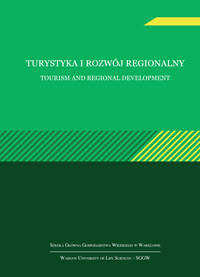Main Article Content
Article Details
Alawadhi S., Aldama-Nalda A., Chourab H., Gil-Garcia J., Leung S., Mellouli S., Nam T., Pardo T., Scholl H., Walker S.: Building Understanding of Smart City Initiatives. Lecture Notes in Computer Science 2012, s. 40–53. (Crossref)
Albino V., Berardi U., Dangelico R. M.: Smart cities: definitions, dimensions, performance, and initiatives. Journal of Urban Technology 2015, nr 1, s. 3–21. (Crossref)
Alexopoulos C., Pereira G.V., Charalabidis Y., Madrid L.: A taxonomy of smart cities initiatives. Proceedings of the 12th International Conference on Theory and Practice of Electronic Governance (ICEGOV’19) 2019, s. 281–290. (Crossref)
Battino S., Lampreu S.: The role of the sharing economy for a sustainable and innovative development of rural areas: a case study in Sardinia (Italy). Sustainability 2019, nr 3004, s. 1–20. (Crossref)
Chourabi H., Nam T., Walker S., Gil-Garcia J., Mellouli S., Nahon K., Pardo T.A., Scholl H.J.: Understanding Smart Cities: An Integrative Framework. 45th Hawaii International Conference on System Sciences 2012, s. 2289–2297. (Crossref)
Duan W., Nasiri R., Karamizadeh S.: Smart city concepts and dimensions. ICIT 2019: Proceedings of the 2019 7th International Conference on Information Technology: IoT and Smart City 2019, s. 488–492. (Crossref)
Florida R.: Cities and the Creative Class. City & Community 2003, nr 2 (1), s. 3–19. (Crossref)
Greco I., Bencardino M.: The paradigm of the modern city: SMART and SENSEable cities for smart, inclusive and sustainable growth. [W:] B. Murgante , S. Misra, A. M. Rocha, C. Torre, J. G. Rocha, M. I. Falcão, D. Taniar, B. O. Apduhan, O. Gervasi (red.): Computational Science and Its Applications – ICCSA 2014. ICCSA 2014. Lecture Notes in Computer Science 2014, vol. 8580, Springer, Cham, s. 579–597. (Crossref)
Greenfield A.: Against the smart city: a pamphlet. This is part I of “The City is Here to Use”. Do projects, Nowy Jork 2013.
Han H., Hawken S.: Introduction: innovation and identity in next-generation smart cities. City, Culture and Society 2018, s. 1–4. (Crossref)
Heffner K.: Obszary wiejskie i małe miasta: czy lokalne centra są potrzebne współczesnej wsi. Studia Ekonomiczne. Zeszyty Naukowe Uniwersytetu Ekonomicznego w Katowicach 2016, nr 279, s. 11–24.
Ilciów A.: W poszukiwaniu smart obywatela. Analiza realizacji koncepcji smart city w Polsce. Acta Politica Polonica 2017, nr 4, s. 33–45. (Crossref)
Jararweh Y., Otoum S., Ridhawi I.A.: Trustworthy and sustainable smart city services at the edge. Sustainable Cities and Society 2020, nr 102394, s. 1–11. (Crossref)
Juzwa N., Gil A.: Rozwój miasta współczesnego na tle procesów uprzemysłowienia. [W:] P. Lorens, I. Mironowicz (red.): Miasto, metropolia, region. Wybrane teorie współczesnej urbanistyki. Politechnika Gdańska, Gdańsk 2013, s. 33–72.
Kowalewski A.: Przez metropolie do dobrobytu? Studia Regionalne i Lokalne 2005, nr 1 (19), s. 15–35.
Łaźniewska E.: Istota koncepcji smart city. Aktywność miasta Poznania na drodze do smart city. Rozwój Regionalny i Polityka Regionalna 2019, nr 48, s. 105–117. (Crossref)
Masik G., Studzińska D.: Ewolucja koncepcji i badania miasta inteligentnego. Przegląd Geograficzny 2018, nr 90 (4), s. 557–571. (Crossref)
Miasta przyszłości – Wyzwania, wizje, perspektywy. Komisja Europejska, Dyrekcja Generalna ds. Polityki Regionalnej, Luksemburg 2011.
Monfaredzadeh T., Berardi U.: Beneath the smart city: dichotomy between sustainability and competitiveness. International Journal of Sustainable Building Technology and Urban Development 2015, nr 3, s. 140–156. (Crossref)
Noori N., de Jong M. , Janssen M., Schraven D., Hoppe T.: Input-output modeling for smart city development. Journal of Urban Technology 2020, s. 1–22, doi:10.1080/10630732.2020.1794728. (Crossref)
Pichlak M.: Inteligentne miasta w Polsce – rzeczywistość czy utopia? Zeszyty Naukowe Politechniki Śląskiej. Seria: Organizacja i Zarządzanie 2018, z. 127, s. 191–206.
Sikora-Fernandez D.: Koncepcja smart city w założeniach polityki rozwoju miasta – polska perspektywa. Acta Universitatis Lodziensis. Folia Oeconomica 2013, nr 290: Oblicza innowacyjności w regionie, s. 83–94.
Smart cities – Ranking of European medium-sized cities. Centre of Regional Science. Wiedeń 2007.
Szymańska D., Korolko M.: Inteligentne miasta: idea, koncepcje i wdrożenia. Wydawnictwo Naukowe Uniwersytetu Mikołaja Kopernika, Toruń 2015.
Tacoli C.: Why small towns matter: urbanisation, rural transformations and food security. IIED Briefing 2017.
World Urbanization Prospects. The 2018 Revision. United Nations, New York 2019. www.bdl.stat.gov.pl/BDL/start (dostęp: 4.12.2020).
Downloads
- Paweł Dziemdziela, Krystyna Krzyżanowska, Przestrzenne zróżnicowanie poziomu przedsiębiorczości w gminach wiejskich województwa łódzkiego , Turystyka i Rozwój Regionalny: Nr 15 (2021)
Możesz również Rozpocznij zaawansowane wyszukiwanie podobieństw dla tego artykułu.
- Karolina Józefowicz, Kinga Smolińska, Poziom rozwoju społeczno-gospodarczego w powiatach województwa wielkopolskiego , Turystyka i Rozwój Regionalny: Nr 11 (2019)

Utwór dostępny jest na licencji Creative Commons Uznanie autorstwa – Użycie niekomercyjne 4.0 Międzynarodowe.





